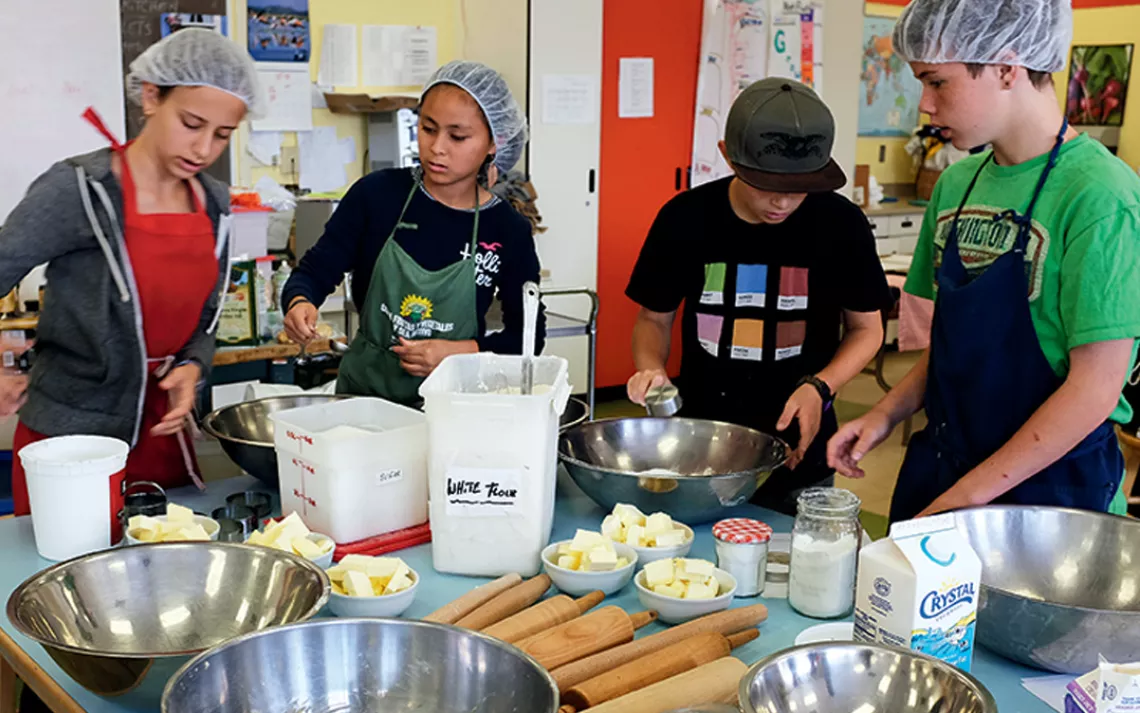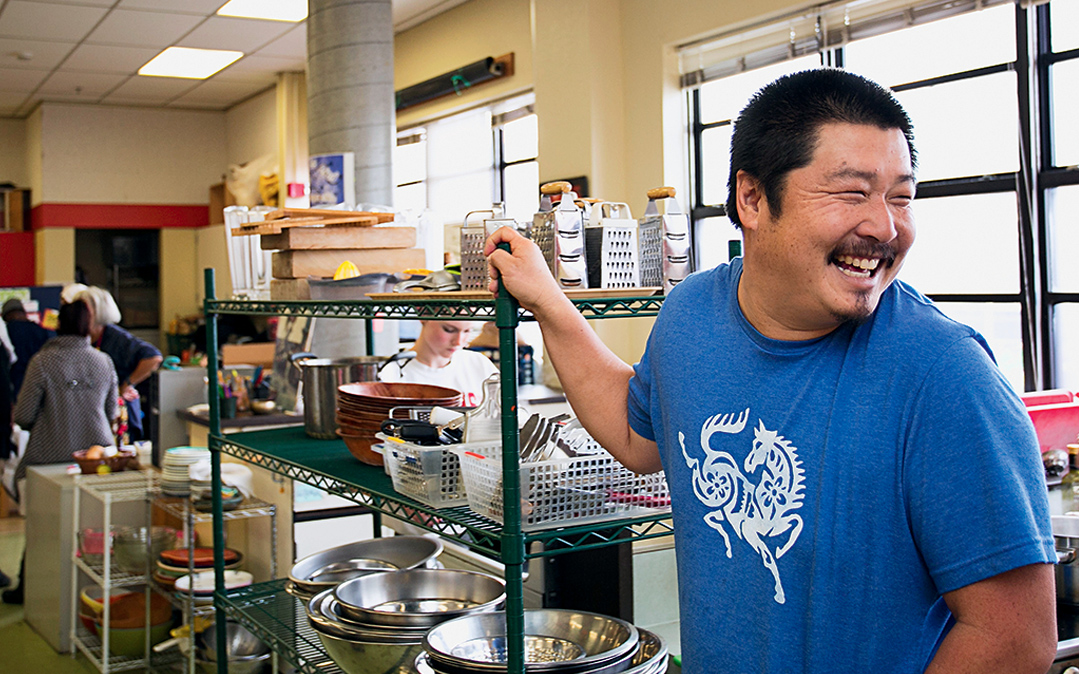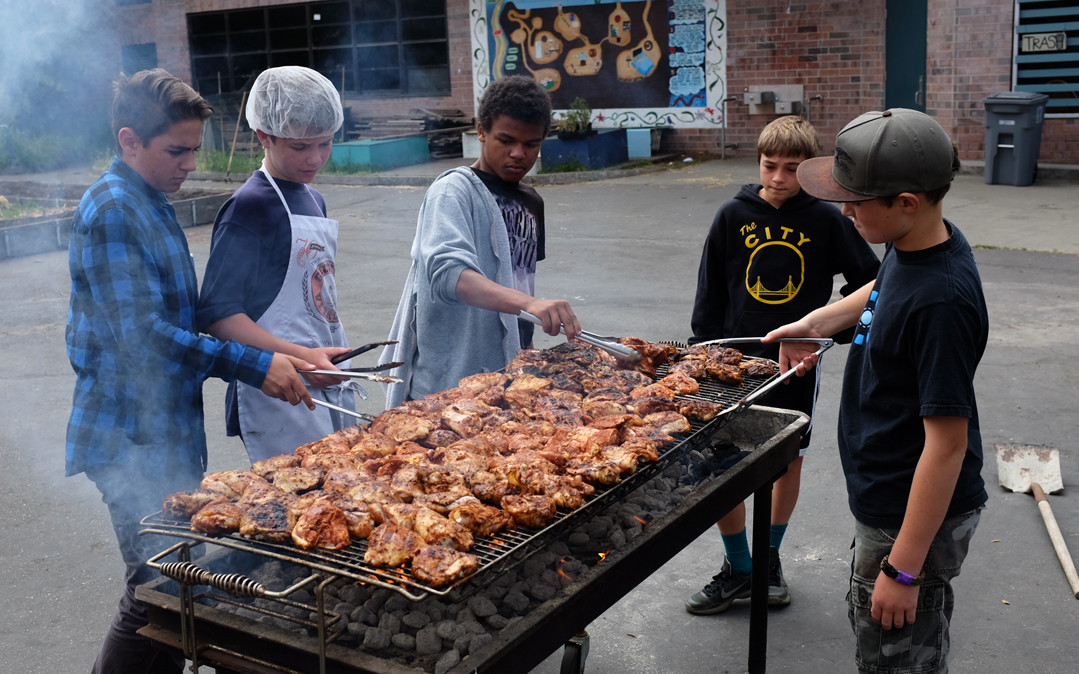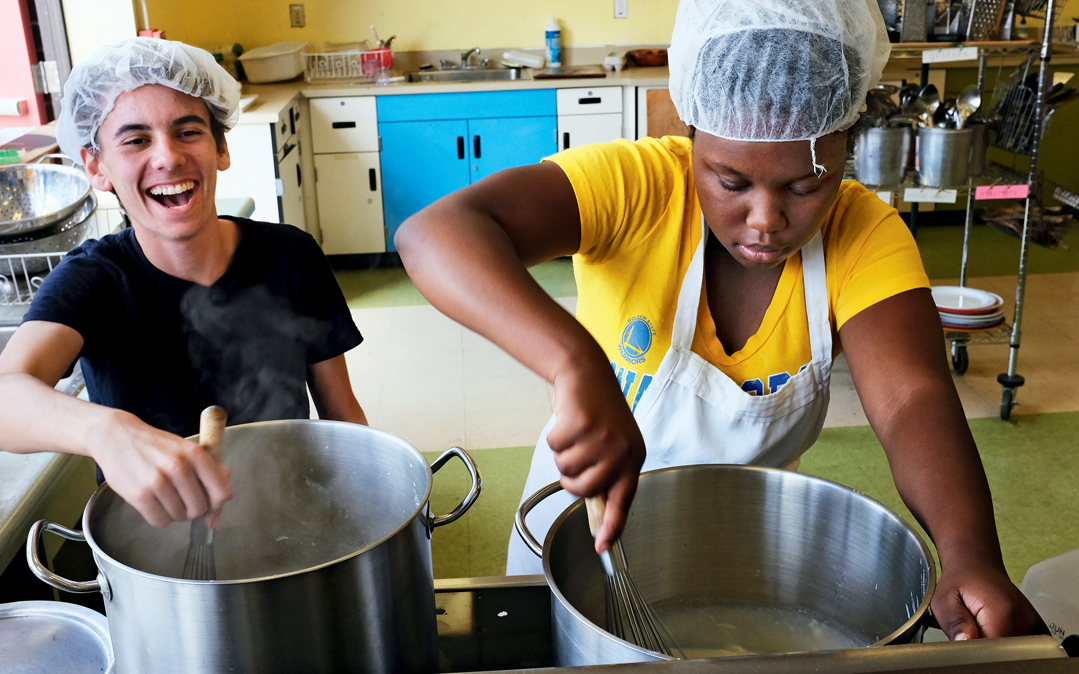Berkeley Middle Schoolers Keep Their Cooking Program Afloat
To save their school's garden, these kids became online entrepreneurs

Self-financing cooking program: The seventh and eighth graders in Growing Leaders plan, cook, and sell 220 meals a week. | Photo courtesy of Matt Tsang
Matt Tsang, the longtime garden teacher at Willard Middle School in Berkeley, California, never set out to run "a catering company out of a home economics classroom." Nor had his students' parents ever considered pushing the nation's first soda tax. But four years ago, the Berkeley Unified School District lost the $1.9 million federal grant that had helped fund cooking and gardening classes in its elementary and middle schools for a dozen years. Some PTAs scrambled to make up the difference, but most schools cut back dramatically on garden programs and axed cooking altogether.
That's when Tsang and other fans of the popular classes got creative about fundraising. A soft-spoken, easygoing teacher and enthusiastic home cook, Tsang was already running a summer program in which at-risk teens grew greens for local restaurants. He scaled up the concept at Willard, which has its own large garden. The result was Growing Leaders. Now in its third year, the elective for seventh and eighth graders raises money by preparing biweekly dinners for sale to parents and other supporters.
By happy chance, around the same time as Growing Leaders' inception, a new online platform dubbed Josephine debuted in neighboring Oakland. The start-up helps enterprising home chefs reach out to hungry consumers, who purchase meals through the website and pick them up at the cooks' homes. Josephine's founders immediately recognized Growing Leaders as a good fit when a Willard parent brought it to their attention. The partnership provided Growing Leaders with a user-friendly system for placing and tracking orders and introduced hundreds of potential new customers to Josephine.

Much of the produce for Growing Leaders' meals comes from the large garden at Berkeley's Willard Middle School, which Matt Tsang oversees. Proceeds from those meals—together with the city's penny-an-ounce tax on sugary drinks—keep the program going. | Photo by Bert Johnson/East Bay Express
In Willard's spacious classroom kitchen, students work quickly and efficiently, chopping, processing, and preparing food for that week's meal—a chicken curry, a garden salad, and a delicious pineapple-carrot loaf cake—with a single-mindedness seldom seen in a room full of teens and tweens. A hum of good-natured banter comes from each table of a dozen or so students, all focused on the tasks at hand. "Feeding people well, setting goals and reaching them—there's a great sense of accomplishment each week in this class," says Hannah Freedman, 13, as she demonstrates impressive knife skills.
On Monday and Tuesday of production weeks, students prep raw ingredients. Cooking happens on Wednesday and Thursday; Thursday is also packaging day for that evening's pickup, and a time when students can gather at the table and eat together, something they do with obvious relish. "It feels good to sample the meal that's going out that afternoon, to know that it's tasty and healthy and that a lot of people are going to eat it that night and enjoy it," says Amanda Sieu, 13.
The meals feature school-grown ingredients. Afraz Ahmed, 12, is particularly fond of harvesting organic produce from the garden for the meal service. "There's responsibility but also a lot of satisfaction in getting the job done as a team and producing a meal we can be proud of," he says.
The program has developed a loyal following among school families and other locals. Growing Leaders usually sells about 220 meals at $11 a pop; people pick them up from the kitchen classroom at the end of the day. Chicken potpie is a popular dish, as is the aforementioned curry. The menu spans the globe, including dishes such as gumbo, posole, empanadas, shawarma, and North African chickpea stew—fitting for a school with a diverse student body. The students figured out early that add-ons are key to profits, so the meals typically include an optional bread or cake. In the fall, when garden produce is abundant, the class makes pantry staples—such as hot sauce, pickles, and preserves—to sell for $8 each.
Willard's Growing Leaders program is often overshadowed by the more famous Edible Schoolyard, founded by restaurateur Alice Waters, at Berkeley's Martin Luther King Jr. Middle School. "Gwyneth Paltrow isn't stopping by to see what these students are doing," jokes George Rose, the credentialed teacher in Willard's Growing Leaders classroom, "but it's phenomenal."

Middle schoolers grill meat for the Growing Leaders program in Berkeley, California. | Photo courtesy of Matt Tsang
In 2014-15, its first year of operation, Growing Leaders netted more than $30,000, all of which was funneled back into the gardening and cooking programs. Profits rose to around $40,000 last year, and Tsang hopes to generate even more in the 2016-17 school year. The school and the PTA also contribute, and the program receives grants and individual donations. But its other large chunk of income—about $30,000 to $35,000—comes courtesy of another local innovation: the soda tax approved by Berkeley voters in 2014, the first of its kind in the nation.
The penny-per-ounce tax on the distribution of sugary beverages was conceived as a public health measure but also as a way to fund cooking and gardening in schools. This past school year, the tax contributed $637,500 to cooking and gardening classes districtwide. "Soda tax funding has allowed the program to begin to rethink stabilization, long-term planning, and adding back staff," says Martin Bourque, executive director of Berkeley's Ecology Center, a key player in the successful soda tax campaign. Similar measures are slated for the ballot this November in the neighboring cities of Albany, Emeryville, Oakland, and San Francisco. Further afield, Seattle and Boulder, Colorado, are considering soda taxes. Philadelphia approved a 1.5-cents-per-ounce tax in June.

Budding chefs participate in Berkeley, California's Growing Leaders program. | Photo courtesy of Matt Tsang
Inventive fundraising aside, Growing Leaders' greatest strength may be its underlying philosophy. Class members vote on all decisions—what dishes to make, how much to charge, whether to buy organic ingredients, and how to divvy up kitchen labor. "This is such an age-appropriate program," says Tsang. "Every student wants to be heard, to assert their autonomy, and for their decisions to matter. This is a place where both high-performing students and low-performing students can come together and excel—and they do. It could be replicated in many other classroom settings."
As is the case with all new businesses, these entrepreneurs learn by their mistakes. Once, in the program's first year of operation, the class didn't cook enough rice; an emergency stop at a Chinese restaurant down the street saved the day but also ate into profits. That stung a bit, Tsang recalls with a laugh. More recently, a cake spillover in the oven threatened to trigger schoolwide fire alarms (not for the first time), so every hand was on deck to fan smoke out the windows. Tsang and the kids were unfazed by the incident.
The young cooks and gardeners in Growing Leaders also learn by their successes. Their business model is the same as that for any food business: The grub has to taste good or customers won't come back. And Growing Leaders' customers keep returning. That loaf cake? My high schooler ate it all in one sitting.
 The Magazine of The Sierra Club
The Magazine of The Sierra Club







